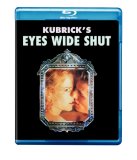| Reviews & Columns |
|
Reviews DVD TV on DVD Blu-ray 4K UHD International DVDs In Theaters Reviews by Studio Video Games Features Collector Series DVDs Easter Egg Database Interviews DVD Talk Radio Feature Articles Columns Anime Talk DVD Savant Horror DVDs The M.O.D. Squad Art House HD Talk Silent DVD
|
DVD Talk Forum |
|
|
| Resources |
|
DVD Price Search Customer Service #'s RCE Info Links |
|
Columns
|
|
|
Eyes Wide Shut
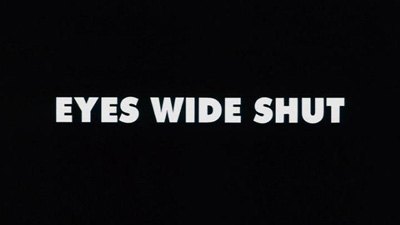
INTRODUCTION:
Stanley Kubrick's final film was also his most anticipated. Losing years to preproduction for Holocaust project-that-never-was The Aryan Papers as well as repeated attempts to adapt Brian Aldiss's short story Super-Toys Last All Summer Long, the gap between Full Metal Jacket and the director's next film ballooned to over a dozen years, nearly twice as long as any other time in his career. When word got out that the man many consider to be the greatest director of all time was making an "erotic thriller" starring Hollywood's biggest couple after over a decade of perceived reclusion, the hype grew to incredible levels, and the film was marketed with perfect minimalism: "Cruise, Kidman, Kubrick." What more did audiences need to know? Apparently, quite a bit, because rumors ran wild about some orgy-filled pornfest with Tom Cruise and Nicole Kidman that would make Caligula himself cringe with embarrassment, and viewers reacted with disappointment and anger when the film that opened in July of 1999 was nothing of the sort. Eyes Wide Shut was far from erotic, barely a thriller, and nowhere near the depraved sexual odyssey implied by the trades. Instead, Kubrick's final film dared to examine our fundamental sexual instincts with brutal honesty, questioning conventions of marriage and monogamy with disturbing insight into love and desire and jealousy and guilt. Furthermore, it built layers of subtle indictment of American consumerism, the role of women in society, and the inseparable nature of sex, money, and power. I cannot say whether lackluster audience reaction was mostly due to misdirected hype, the challenging subject matter, or the simple reality that Stanley Kubrick's films usually take a number of years to find public acceptance. Whatever the reasons, Warner's Blu-ray release presents a wonderful opportunity to revisit this thought-provoking work of art and fitting finale from a visionary master.
CONTENT:
No one opens a film better than Stanley Kubrick, and Eyes Wide Shut continues the rich tradition. Dmitri Shostakovich's "Waltz 2" builds in the background as we cut to Alice Harford (Nicole Kidman) matter-of-factly disrobing in front of a full-length mirror. Her figure is perfect, her movement graceful, but there is nothing particularly sexy about her standing there naked before us, and as quickly as we intrude on her preparation ritual, we are yanked away for the film's title card and an exterior shot that implies a passage of time. How long was she standing there? How many dresses did she try on before finding the right one? Some time later, her husband (Dr. Bill Harford -- Tom Cruise) enters the same room and asks a question that reveals his entire character: "Honey, have you seen my wallet?" Of course she knows where his wallet is: quite appropriately on the bedside table. Then she reveals her own preoccupation: "How do I look?" The exchange is so commonplace that we almost miss the subtext, but it tells us everything we need to know about these characters in less than a minute.
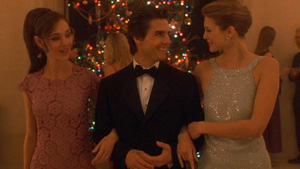
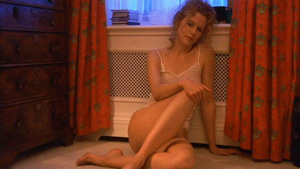
Bill and Alice are preparing to attend a Christmas party at the opulent home of Victor Ziegler (Sydney Pollack), one of the doctor's wealthy and influential patients. The personal service Bill provides to men like Mr. Ziegler has afforded him an impressive lifestyle, with a gorgeous apartment in Manhattan's Upper West Side, and a private family practice where most nights he is home for dinner and available to help his daughter Helena (Madison Eginton) read a story before bed. Alice used to manage an art gallery, a lucrative profession when surrounded by such wealth, but now she focuses on maintaining their social calendar and raising their little girl. The two have been married for 9 years, and by all accounts, they have a loving marriage, a happy family, and a generally fantastic life.
At Ziegler's party, however, we see there is another station in life that dwarfs their own. For as great as the Harfords have it, they are out of their element here, surrounded by the luxuries of incredible wealth and power. Bill recognizes the party pianist, Nick Nightingale (Todd Field), as an old friend who dropped out of medical school, and the two exchange pleasantries made awkward by their differing levels of career success. When Nick is ushered away by an executive in charge of the party, the divide between them is clear: Bill was invited here as a guest, but Nick is on the clock. Meanwhile, Alice has stumbled into the longing gaze of a wealthy Hungarian gentleman (Sky Dumont) who propositions her in the classiest of ways. She can bask in the glory of his considerable wealth and power if she responds to his sexual advances. Alice is quite taken with this man but ultimately pulls herself away, holding aloft her ring finger and noting, "I'm married." Is that the only thing holding her back? Elsewhere at the party, Bill is in the midst of a flirtatious encounter of his own, sandwiched between two strikingly gorgeous models looking to take him, "where the rainbow ends." Their direct meaning is obvious, but the subtext reminds us that money and sex are never far apart. The encounter is cut short, however, when Bill is called away, in very much the same manner as his piano-playing friend, to attend to a delicate medical situation for Mr. Ziegler. Dr. Harford may be a guest at this party, but like Nightingale, he is still the hired help.
The next evening, the events of the party are the subject of intense discussion between Bill and Alice, as Kubrick narrows in on the central theme of his film. Alice trusts her husband, but she is still preoccupied with the fact that he could have had sex with those two women if he wanted to. Worse, she is irritated by his honest acknowledgement that every man wants to have sex with every beautiful woman he sees, but most married men choose not to because they love their wives. It is honest and real, but not particularly comforting. Even so, Alice is most irritated by Bill's complete lack of jealousy towards her encounter with the Hungarian. "You're my wife, you're the mother of my child, and I know you'd never be unfaithful to me." He loves her, and he trusts her, but deep down, that's not enough for Alice. She wants him to be jealous. She wants that power over him. And she claims it by relating to him a time when she fantasized about another man and considered throwing everything away if the opportunity presented itself. This revelation sends Bill into a repressed emotional tailspin and sets in motion the next two hours of the film.
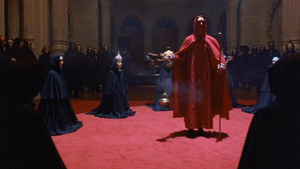
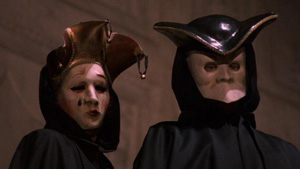
A phone call about a patient gives the good doctor an excuse to leave the apartment for a while, and his night takes one incredible turn after another as he comes face to face with an array of male fantasies: a grieving daughter on the verge of a ridiculous inheritance professing her love for him, a kind prostitute way too attractive for her circumstances (who only charges $150!), and a strange encounter with an underage girl and two Japanese businessmen. Things really get out of hand, though, when he crashes a ritualistic costume orgy too surreal to believe. In fact, his entire adventure strains credibility, and we cannot help but wonder if the line between fantasy and reality has blurred before our eyes. The source material for the film, Arthur Schnitzler's Traumnovelle, literally translates as "Dream Novella", and while Kubrick has fleshed out the story to be more meaningful and effective, its dreamlike core remains. Every scene is lit with the ethereal glow of Christmas decorations, and Dr. Harford's nighttime journey is dominated by coincidence. Even Manhattan is clearly staged to look less like the actual place and more like a romanticized idea of what it might be. When Bill returns home from his escapades, he finds that he was not the only one to embark on a sexual adventure that evening. Alice too had one incredible night, but hers took place quite literally within a dream, or perhaps a nightmare.
On the surface, Eyes Wide Shut is a daring exploration of sexual obsession, but as one could always expect from the late director, there is far more going on in this film than just the primary narrative. Most noteworthy, Kubrick is constantly skewering American consumerism, with reminders of Christmas (the ultimate example) in nearly every frame of the film but no discussion of its purpose or its meaning. A pan across Dr. Harford's office reveals holiday decorations, dozens of Christmas cards, and a sign that reads, "Payment is expected when services are rendered." Even Bill's name subtly suggests payment, and he flaunts his wealth at every possible turn, riffling through his wallet for hundreds of dollars at a clip whenever the opportunity strikes. The amount of money he spends during this fateful evening is absolutely ridiculous, and he doesn't bat an eye, happy that he can afford to buy whatever or whomever he pleases. And yet there's still a social status well above his and powerful people who can buy him just as easily. When it appears that a murder may have taken place, Kubrick reminds us of a thematic constant through all his films (notably A Clockwork Orange, winked at here with the use of Fidelio): culture does not necessarily refine society. You can listen to the best music, drink the finest wines, and deal in all manner of accepted art, but that doesn't make you any more likely to affect society in a positive way. Regardless of how you interpret the repercussions of Bill's adventure, the power players in this film are responsible for numerous instances of accepted abuse.
Eyes Wide Shut is so many things that it completely defies categorization, and one could argue that the cinematic master's final film is also his most insightful. The depth of storytelling and psychological examination is really quite astounding, and like so many of Stanley Kubrick's films, repeat viewings continue to reveal layer upon layer of symbolism and meaning. Consider a seemingly innocent montage that parallels Bill's working day with that of Alice. At first glance, these scenes appear merely a bridge to the next plot point, but closer attention reveals just what it is that Alice does with herself all day. She grooms. She grooms herself to be the perfect trophy at her husband's side, and she grooms her daughter to follow along in her footsteps. Even the math problem they work on together is a lesson in determining how much more money one boy has over another. Sex, money, power -- they're all intertwined, and Eyes Wide Shut makes us question personal motivations and the nature of our own relationships, with significant others and within society as a whole. It is a powerful piece of filmmaking and an effective conclusion to an incredible career.
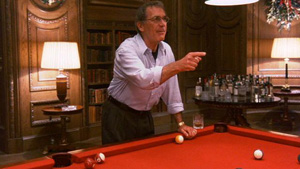
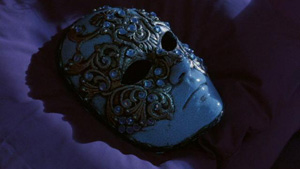
PRESENTATION:
Eyes Wide Shut makes its debut on Blu-ray in 1080p with VC-1 encoding. Like the release of The Shining, the film is presented in its cinematic aspect ratio of 1.78:1. While framing is less of an issue with this title than the Nicholson classic (comparison below), it is still preferable to watch the film at home the way it was originally shown in the theater -- well, not entirely like the original theatrical release, as the silly digital censoring required to get an R rating has finally been removed for American audiences. As expected, the ado was essentially over nothing, and it is nice to finally be rid of the distracting and entirely pointless radio edits. Of note, the case reads, "Movie selectable in both rated and unrated versions", but as far as I can tell, only the unrated (or proper) version is included here (as if anyone's dying to have the other version in the first place).
Somewhat disappointingly, while the cut and framing of the film are an improvement over previous releases, there isn't a great deal to be gained in terms of picture quality from this high-definition transfer. Colors are better, and there is a higher degree of detail available in the shots, but the improvements are mostly small and subtle. Due to the style in which the film was shot, emphasizing natural lighting and stressing a dreamlike quality, many scenes are intentionally oversaturated or washed out, and there is a significant amount of grain. By no means is this a bad transfer, and I detected no damage to the print or distracting compression artifacts, but you're unlikely to be wowed by the upgrade to high-definition with this title.
Audio is more of the same. An uncompressed PCM 5.1 track is included in English, as well as English, French, Spanish, German, Italian, and Japanese Dolby Digital 5.1. Differences between the compressed and uncompressed audio are nominal, and surround channels are used sparingly. In truth, there's no reason for them at all, except perhaps to provide atmosphere at the surreal costume party. As with the video, there's nothing wrong with the audio -- dialogue is clean and balanced effectively in the front channels -- but it doesn't see much benefit from the increased resolution available to the format.
Subtitles are available in numerous languages for the feature and bonus material.
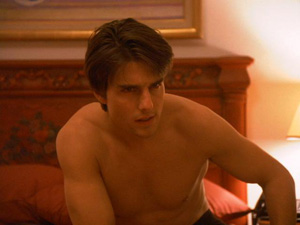 1.33:1 | 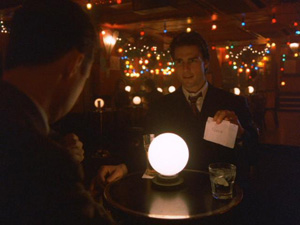 1.33:1 |
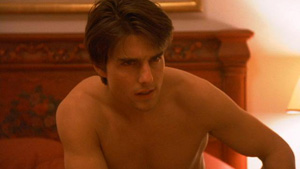 1.78:1 | 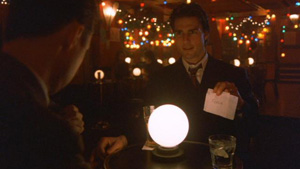 1.78:1 |
WHISTLES & BELLS:
The menu structure for this release is designed a little differently from the other Kubrick titles. Bonus features are divided into two primary categories: "Behind the Story" and "Interview Gallery". I understand the latter grouping, but "Behind the Story" is a terrible label for three pieces that have nothing to do with one another, only one relating to Eyes Wide Shut in the first place.
- The Last Movie: Stanley Kubrick and Eyes Wide Shut (43:08)
A Channel Four documentary that covers A.I. almost as much as Eyes Wide Shut. Tom Cruise, Nicole Kidman, and Sydney Pollack are on hand to talk about the film in question, as well as Steven Spielberg and a whole host of collaborators on the A.I. project. The best material included here comes from Kubrick's family members and the shots of their estate. While the production quality is poor, with laughable visual effects and over-the-top music, the content is definitely worth watching.
- Lost Kubrick: The Unfinished Films of Stanley Kubrick (20:19)
Semi-narrated by Malcolm McDowell, this piece covers the countless years Kubrick spent trying to develop Napoleon and The Aryan Papers. I have read a lot about these projects over the years, but seeing the involved parties discuss them on camera is particularly illuminating.
- DGA D.W. Griffith Award Acceptance Speech, 1998 (4:03)
A somewhat dry and awkward speech, this is uniquely Kubrick, as he shares his often talked about take on the Icarus myth. The piece is briefly introduced by interview footage with Jack Nicholson, and to be frank, I'd rather listen to Jack tell the story of the speech than the speech itself.
- Interview Gallery
Extended interview material with Tom Cruise (8:43), Nicole Kidman (18:29), and Steven Spielberg (8:07) is ported over from the previous DVD release. Well over half of this footage is woven into the other features on the disc, but it's worth wading through the repeat material to see some of the more emotional and honest moments.
- TV Spots
- Theatrical Trailer
CONCLUDING THOUGHTS:
Eyes Wide Shut is an impressive achievement from a man whose resume was already overflowing with brilliance. Cruise and Kidman are excellent as they explore truths about marriage, desire, and fidelity that most people would prefer not discuss; and once again, Stanley Kubrick crafts a world that is entirely mesmerizing, blurring fantasy and reality in a sometimes uncomfortable psychological examination of human nature. Kubrick's final film failed to reach audiences during its initial release, and it's about time for that to change. Not everyone will love this film, but I am convinced that a large portion of those who dismissed it years ago will find greater depth and appreciation for this work of art if they give it a second chance. While the audio and video don't benefit greatly from the added resolution of high-definition, the cinematic framing, lack of annoying digital MPAA nonsense, and solid bonus features present a good opportunity to revisit the final work of our greatest filmmaker. Highly Recommended.
N.B.: Images in this review exist to look pretty and are in no way representative of the quality of the high-definition transfer
|
| Popular Reviews |
| Sponsored Links |
|
|
| Sponsored Links |
|
|
| Release List | Reviews | Shop | Newsletter | Forum | DVD Giveaways | Blu-Ray | Advertise |
|
Copyright 2024 DVDTalk.com All Rights Reserved. Legal Info, Privacy Policy, Terms of Use,
Manage Preferences,
Your Privacy Choices | |||||||









